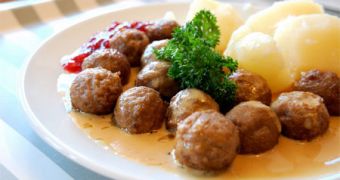By the looks of it, the horsemeat scandal that took the UK and later on Europe by storm several weeks ago is far from being over.
Quite the contrary, Ikea is now making headlines following its going public with the news that a batch of its meatballs also contained horsemeat, and was therefore withdrawn from sale in 13 countries:
Slovakia, the Czech Republic, Hungary, France, Britain, Portugal, Italy, Netherlands, Belgium, Spain, Greece, Cyprus and Ireland.
It appears that this batch of tainted meatballs was going to be marketed at Ikea stores in said 13 countries across Europe despite the packs' displaying a rather misleading label.
Thus, the meatballs were allegedly made from beef and pork, yet the Czech Republic's State Veterinary Administration has managed to pin down traces of horse DNA in them. Sources report that these meatballs were supposed to be sold in frozen packs of 1 kilogram each (2.2lb), and that the troublesome batch was successfully dealt with by Ikea.
Interestingly enough, it was only two weeks ago when the Ikea group commissioned a thorough investigation of the meat products they marketed, yet the samples tested by the company thus far were found not to contain any traces of horse DNA.
“Already two weeks ago, Ikea Group initiated DNA analyses of all meat products in the range. 12 tested samples of different batches of meatballs showed no traces of horsemeat,” the company wished to emphasize.
Commenting on their recalling this batch of meatballs, a spokesperson for the company said that, “Ikea takes the test result from the Czech Republic authorities showing indications of traces of horse meat seriously. The concerned production batch of meatballs has been withdrawn from the Swedish Food Market in the Ikea stores.”
According to Fast Company, one other statement issued by Ikea read as follows: “We do not tolerate any other ingredients than the ones stipulated in our recipes or specifications, secured through set standards, certifications and product analysis by accredited laboratories.”

 14 DAY TRIAL //
14 DAY TRIAL //